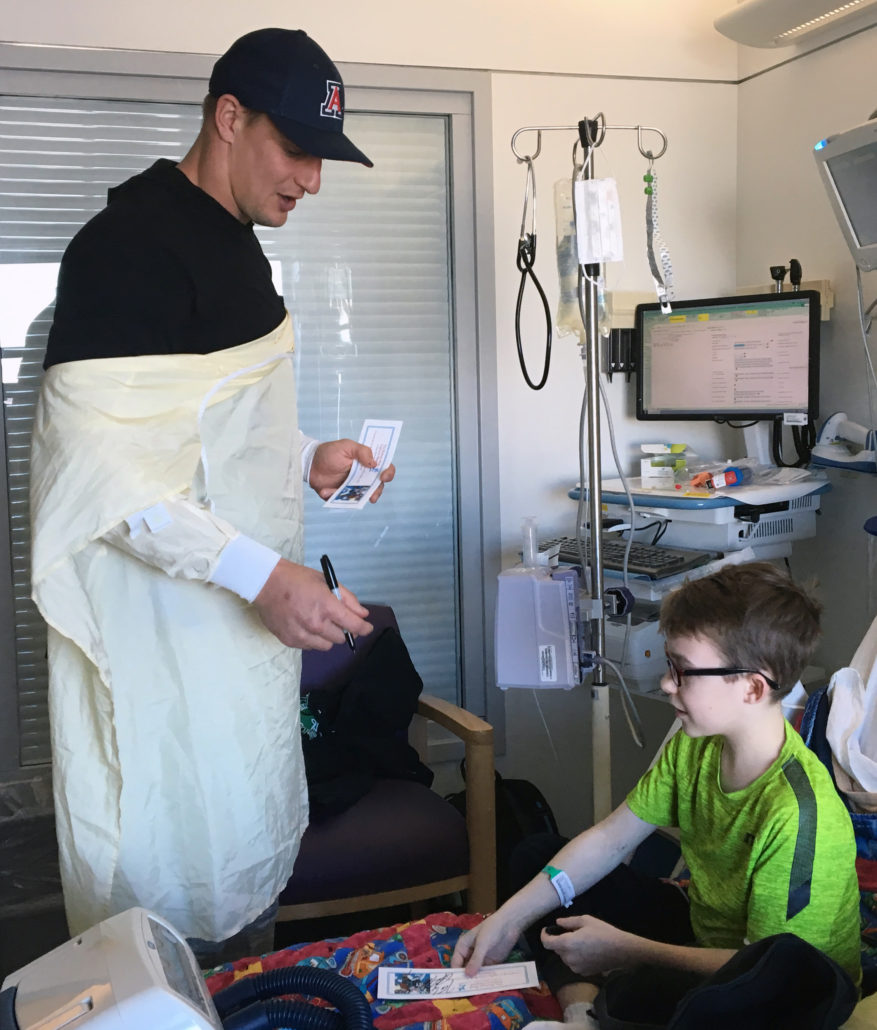
Thirteen-year-old Jacob Seigars, of Palermo, attended China schools until October 2017 when he transferred to Palermo Consolidated School. He continues to attend Palermo Consolidated via robot generously provided by Grahamtastic.org
Jacob’s mother is Heather Seigars, his father is Joseph (Joe) Seigars and his bonus mother is Natasha Seigars. Jacob has a 15-year-old brother named Shawn, as well as three younger siblings, Achiva (10), Joe joe (7) and Isabella (3). He also has two pets: a yellow lab named Honey and a cat named Shade.

Jacob Seigars, of Palermo, with New England Patriots tight end Rob Gronkowski at the Barbara Bush Children’s Hospital, in Portland. Photos courtesy of Mark Huard
As many know Jacob has a fantastic sense of humor. He can take any situation and find humor, even when it’s a situation that is as debilitating as being diagnosed with Acute Myeloid Leukemia. After being sick with numerous illnesses for about six consecutive weeks, including colds and pneumonia, Jacob was diagnosed with AML on January 15, 2018, and admitted to Barbara Bush Children’s Hospital, in Portland, that same day. He has remained an inpatient at Barbara Bush since then and will remain in the hospital for at least a few more months. Jacob completed his second round of chemotherapy on February 18. He continues to fight Leukemia and is determined to beat the disease.
Jacob is a phenomenal athlete and whatever sport he plays he puts his whole heart into it! He stands out by his skill and his positive nature. Jacob started playing soccer at the age of three, and started playing basketball at the age of four. Jacob started baseball at five years of age with tee-ball and played up through Little League through sixth grade. Jacob joined track and field in sixth grade and continued to compete in seventh grade, also. His best events are discus and hurdles.
Jacob has received a lot of recognition over the years because of his athletic ability and been an integral part of many teams. His middle school soccer team has won the SVAC championship the last two years. His middle school basketball team last season, China Clippers, placed second in the 2017 SVAC championship. Last season Jacob placed first in hurdles at the invitational meet. Jacob recently earned a spot to the Dirigo U14 Premier soccer team and is hoping to get back on the field soon! This season Jacob played for the Palermo varsity basketball team. He was struggling health wise this season but still managed to dominate the court and end each game with “double-doubles” while he was still able to play.
Not only does Jacob love playing sports but he loves watching them as well! Jacob loves watching the New England Patriots play football. His favorite players are Chris Hogan, Deion Lewis, and Gronk. Jacob got a surprise on February 13, when Rob Gronkowski along with his father and two brothers visited the Barbara Bush Children’s Hospital to deliver a $25,000 donation to the hospital from Gronk Nation! Jacob’s counts were so low he was unable to attend the gathering and the ball spiking lesson with Gronk, so Gronk and his dad were kind enough to stop by and visit in Jacob’s room!
For more updates on Jacob’s fight and upcoming events please follow www.facebook.com/PrayforJacob18.
A dodgeball tournament has been scheduled by Whitefield Elementary for March 2 and 3v3 basketball tournament for March 4 has been scheduled by Mike Roderick and Becky and Chris Young to be held at Erskine Academy. A donation account has been established at Bar Harbor Bank and Trust. The family’s address is: The Seigars Family, 888 Route 3, Palermo, ME 04354.

William Alger, of Winslow, is pictured with New England Patriots tight end Rob Gronkowski at the Barbara Bush Children’s Hospital, in Portland. Photos courtesy of Mark Huard
William Alger, 12, of Winslow has Cystic Fibrosis. CF is a genetic disorder that causes complications in the respiratory and digestive systems. He typically visits the Barbara Bush Children’s Hospital, in Portland, for a “clean-out,” which is a 14-day course of antibiotics administered through an IV, once every year or two.
William has been in the hospital since January 31 and recently returned home on February 20. The goals of this admission were to improve his lung function and to gain weight. Healthy weight has a direct correlation to higher lung function in CF patients. William has been busy working through his treatments, with his tutor, keeping caught up on his academics. He has been working hard in physical therapy also – getting lots of exercise to stay strong. He also gets to have some fun with the Playroom staff and other kiddos.
William’s mom Esther Bullard is quoted as saying, “Our time here is filled with sleepless nights, busy days, and an enormous effort to improve William’s overall health outcomes. One of the blessings here at Barbara Bush Children’s Hospital is that special guests come and meet with the kids, providing much needed encouragement. Today William got to meet New England Patriots tight end Rob Gronkowski! It was an incredible, unforgettable surprise.”
Gronk was so kind and humble. He took time to talk with William. They chatted about the Super Bowl game, and he asked, “so what’s your favorite sport?” William responded, “well it’s lacrosse,” which was so funny! Gronk wasn’t expecting that answer (obviously), and he said, “that’s cool, I’ve never played lacrosse!” And, of course, William said Gronk was his favorite football player, and that the Patriots are his favorite team.
William got two autographs and some amazing photos. It was a wonderful day for William that will be forever remembered.

William Alger, of Winslow, gets an autograph from New England Patriots tight end Rob Gronkowski at the Barbara Bush Children’s Hospital, in Portland. Photos courtesy of Mark Huard







 Mikayla Godleski, of Sidney, was among 228 students from
Mikayla Godleski, of Sidney, was among 228 students from  Andrew Browne, of Vassalboro, majoring in communication, was among 2,419 students at Coastal Carolina University, in Conway, South Carolina, who made the fall semester 2017 dean’s list.
Andrew Browne, of Vassalboro, majoring in communication, was among 2,419 students at Coastal Carolina University, in Conway, South Carolina, who made the fall semester 2017 dean’s list.
 For safety’s sake,
For safety’s sake, 
 All eighth grade students and their parents from the surrounding communities are invited to attend the Erskine Academy Eighth Grade Open House on Wednesday, February 28, at 6:30 p.m., in the gym. The administration strongly encourages all incoming freshmen and their parents to attend this event as registration materials will be available and information about the course selection process will be provided. In the case of inclement weather, a snow date of Thursday, March 1, has been set.
All eighth grade students and their parents from the surrounding communities are invited to attend the Erskine Academy Eighth Grade Open House on Wednesday, February 28, at 6:30 p.m., in the gym. The administration strongly encourages all incoming freshmen and their parents to attend this event as registration materials will be available and information about the course selection process will be provided. In the case of inclement weather, a snow date of Thursday, March 1, has been set.